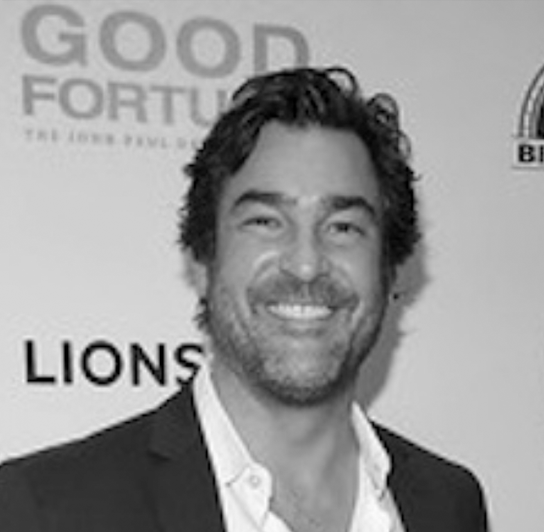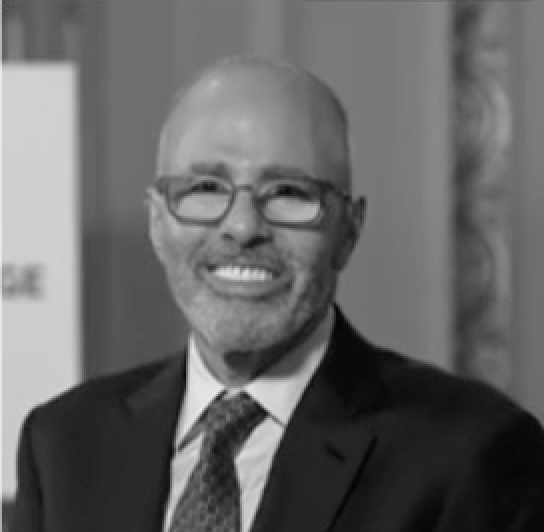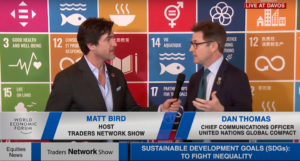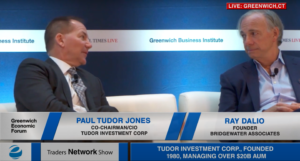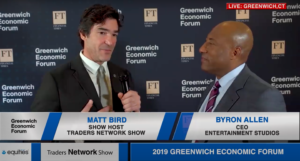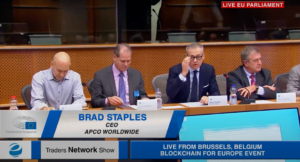Bob Roth and Julia La Roche Deliver Fireside Chat at Greenwich Economic Forum | Traders Network Show – Greenwich, CT
Contributed by: Show Editorial Team
Julia La Roche, Correspondent at Yahoo Finance interviews Bob Roth, CEO of the David Lynch Foundation at Greenwich Economic Forum (Greenwich, CT)
HIGHLIGHTS
- Ray Dalio calls transcendental meditation “single most important reason” for his success
- Transcendental meditation is theorized to give people effortless access to calm depths of their mind
- Study’s show transcendental meditation in schools lead to a. 70% reduction in arrest for violent crimes among at-risk teens in Chicago
FULL COVERAGE
INTERVIEW TRANSCRIPTS: Julia La Roche, Correspondent for Yahoo Financeand Bob Roth, CEO of the David Lynch Foundation
Julia La Roche – Correspondent, Yahoo Finance: 00:00
I’m joined by Bob Roth. He is the CEO of the David Lynch foundation and Bob, throughout the last 50 years or so, you’ve helped thousands of people everyone from the business Titans that we all know today to some of the most well known celebrities to inner city school children, military veterans, just working moms and dads, basically anybody and everybody apply this to their lives and they’re seeing real results. So I guess to start what is transcendental meditation?
Bob Roth – CEO, David Lynch Foundation: 00:34
Well, I even think the first question to that is what is the topic of transcendental meditation doing it? The Greenwich Economic Forum?
Julia La Roche – Correspondent, Yahoo Finance: 00:42
Well, we have heard it come up a few times from Ray Dalio.
Bob Roth – CEO, David Lynch Foundation: 00:46
Yeah. And Ray, as many of you may know says that this meditation is the single most important reason for any success he’s had in life. So why would someone like him do that? So what is meditation in general and then transcendental meditation? So how many people here have tried some type of meditation at some point? And some many people just think the whole idea of meditation is just too woo. Just too out there. No one wants good. Good. So what I want to do in the few minutes that we have with this wonderful Julie is to define and demystify and give a scientific basis to what meditation is. Because the idea of meditation is no longer a luxury. It’s no longer can be just considered. That’s fringe. And that’s off for no, you know, whatever. We live in very stressful times.
Bob Roth – CEO, David Lynch Foundation: 01:41
We live in traumatic times. The gentleman before we said, when the unexpected happens, well excuse me, the unexpected is expected to happen. And what is it that allows us to respond to the unexpected? What is it that allows us to be resilient, to be flexible, to be innovative, to think clearly. Yes, exercise is important. Yes, diet is important, but this is from the neck down. What are we doing with this three pound organ from which makes the decisions innovates recalibrates decides. And so to answer your question, enter the realm of meditation and specifically transcendental meditation. Decades ago. You wouldn’t even want to use the word and in polite company today, it’s widely practiced. So to understand meditation quickly and then to answer your question, I promise, but to answer it too. Meditation, I like to use the example of an ocean. This is just a simple analogy. You’re on a little boat, you’re in the middle of the Atlantic ocean and all of a sudden you get these giant 30, 40, 50, foot high waves, and you could think the whole ocean is an upheaval, but do a cross section of the ocean and the is over a mile deep and will, the nature of the ocean on the surface may be turbulent. The nature of the ocean at its depth is pretty darn silent. So that’s a model for meditation. I’m going to pause here, but say one thing before I continue.
Bob Roth – CEO, David Lynch Foundation: 03:16
When you think of what a meditation teacher would be like, I’m probably pretty much not that guy. I love science. I love data. I am a skeptic. I’m not a cynic. I’d never get out of bed. So what we’re talking about here today is if you want to remove the word meditation or transcendental meditation, just think of technique X. Think of, just forget that. We’re going to look at what science tells us about these practices. So meditation in general says you want to create calm in the ocean than you thought. Waves are the disruptor of calm. If you want to have a calm mind, you’ve got all these thoughts. So you’ve got to stop thoughts. That’s you. To think of meditation, ohm and close your eyes and clear your mind of thoughts and all this sort of Hollywood characterization. That’s very difficult to do. But there is data to show that that helps.
Bob Roth – CEO, David Lynch Foundation: 04:12
Transcendental meditation, two hours after you asked the question, transcendental meditation recognizes that there’s a vertical dimension to the mind and gives axis hypothesizes the deep within everyone, whether you’re a skeptic or not, it does not matter deep within every one of us right now, there’s a level where the mind is your mind is already settled. Hypothesis, peaceful, awake, calm from where you make smart decisions. We lost access to that. We’re stuck up here. So what this meditation does, it gives effortless access to that. And when you do that and anyone can do it, this is what happens. According to research at Harvard medical school and published in scientific American, your body gains a state of rest in many regards deeper than the deepest part of deep sleep. So what? You ever heard of cortisol, cortisol is your stress hormone. When you get anxious about something, your body secretes cortisol. When your body secretes cortisol, you get more anxious, vicious cycle, you get a good night’s sleep, cortisol levels drop 10% 20 minutes of transcendental meditation drops, 30 to 40% published research, peer review every time. I’m now going to let Julia ask a question.
Julia La Roche – Correspondent, Yahoo Finance: 05:29
Bob, I think you answered like four of my questions that I had there. I, you, you brought up something that you also bring up in your book, strength and stillness, which you can get a copy when you leave here today about being a skeptic. So I want to go back to young Bob Roth that skeptical Bob Roth and when you were first exposed to the practice, take us back on that journey for you.
Bob Roth – CEO, David Lynch Foundation: 05:54
Well, I grew up as a San Francisco giants baseball fan. I grew up in the San Francisco Bay area. My father was a world war II vet who was working at Fort Miley VA hospital. I was interested in politics. I wanted to be a us Senator. I went to college with the idea of becoming a us Senator. It didn’t take me very, this was back, I’m 1968. I’m 69 years old. I’ve been meditating 50 years and I thought politics was going to be the way to make a change and politics is important with never going to heal the soul of the nation. And so then I thought education, that’s what I wanted to do. So write educational curriculum for children that could help them navigate like our kids, your kids, a very stressful world. And that was 50 years ago. So I’m going to school full time, I’m working full time.
Bob Roth – CEO, David Lynch Foundation: 06:47
There’s a lot of crazy stuff going on and I’m not buying any of it. But one person who I really trusted a down to earth guy was doing something called meditation was not a word in my vocabulary. I said, I don’t believe in any of that stuff. And he held up a book, a pen, and he’s dropped it and he said, you don’t have to believe in gravity for the book to fall and you don’t have to believe in this meditation for it to work. So I decided I wouldn’t learn it. I haven’t. If it didn’t like it, I’ll quit after five seconds. And it was so relaxing, so relaxing, physically relaxing, like all the research shows. So Mark that right after that, my first thought was, Oh, so this is going to be the tool I’m going to teach those kids. I wanted to work with kids and that was June 28 1969. 50 years ago. I now hit up a foundation, the David Lynch foundation with a great filmmaker, David Lynch, and we’ve now provided the scholarships for a million inner city school kids to learn to meditate for free. Ray rivers is a great friend and supporter of the David Lynch foundation. I just came back from an hour long meeting with my colleague Fred Plesser with the secretary Robert Wilkie, the VA secretary were talking to him and his people about what it will take to bring this meditation to 1 million veterans who suffer from post traumatic stress disorder because the data shows it works.
Julia La Roche – Correspondent, Yahoo Finance: 08:17
That’s amazing. Let’s talk about the data because you mentioned you were skeptic that you really like science, but you’re actually seeing results. So those school children you were referencing using a transcendental meditation, what kind of results are you seeing in the classroom outside of the classroom? If you can speak to that?
Bob Roth – CEO, David Lynch Foundation: 08:38
How many of you have children or grandchildren and you’re worried about, you’re concerned about their anxiety levels and you think, why? I mean, not why, you know why? I mean, cyber bullying, pressure school, everything. Children are getting the secretary, I, the surgeon, general past surgeon general said, if Americans are swimming in an ocean of stress, our children are drowning in it and they don’t have the brain capacity, the brain functioning to be able to deal with those pressures, those stresses. It’s traumatizing the number two cause of death among teenagers in America, suicide and the fastest rate of growth of that in that demographic. Girls 13 to 16 something’s wrong. And so what we’re doing is we’re equipping children with a non-religious, non-philosophical. Anybody can do this meditation. There’s no philosophy. You can think it’s a crock. It works great. Fine. Ray does it.
Bob Roth – CEO, David Lynch Foundation: 09:39
His family does it that Ray does it. You learn this meditation just sitting comfortably like this. You’ll allow, do the simple technique. Your attention settles down, your body gains this deep rest. The research shows published research, improved grades, improved test scores, kids get crushed under the pressure of, of tests, of testing reduced suspensions and expulsions. We’re now have started a study starting a study at Mount Sinai hospital on opioid addiction among teenagers. We just come. So there’s improved academic performance. But here’s something. University of Chicago crime lab recently funded a $3 million study on 2000 kids in the toughest schools in Chicago. And what they were looking for is could this reduce arrests for violent crime? It’s the reactivity of the brain. It’s the amygdala, the hyperreactivity, the brain. And if a child gets arrested for violent crime, school to prison pipeline, life ruined. If you do an intervention to reduce arrest for violent crime, this is the toughest schools in Chicago picked by the Chicago public school system. If you reduce arrest by five or 10%, you’re happy. The meditating teenagers in the most violent neighborhoods, 70% reduction in arrest for violent crime. So now what we’re doing is we’re replicating, we want to replicate that with 4,000 kids in the LA school district and the New York city school district such that this becomes like PE. Like it’s a tool that children need to have in their toolbox and we need to have in our toolbox, right?
Julia La Roche – Correspondent, Yahoo Finance: 11:24
And when you bring up the idea of having a tool that, that’s a great way to think about applying it because you can literally do this anywhere, right? Bob, I can do this in the back of an Uber somewhere or maybe go sit at my desk or something. It doesn’t matter where you are.
Bob Roth – CEO, David Lynch Foundation: 11:40
I’ve done it at Yankee stadium on a slow day or I could say I should say Jet’s game, but I wouldn’t say that.
Julia La Roche – Correspondent, Yahoo Finance: 11:47)
Were you just going to sit out there and the speaker loan.
Bob Roth – CEO, David Lynch Foundation: 11:49
Yeah. This is, this is not something where you have to sit, pretzel it. I mean literally you just, I’m leaning, I lean back, but you just like, you are just like that. It’s silent. You what you, I should say, this is not a mass meditation. This is, there’s a lot of apps and things that are fine. They’re sort of S they’re like a little entry level. This TM and I should say we’ve now taught, offered this at Bridgewater to 900 employees and they have meditation rooms there. But we’ve also worked with all the major banks in New York city for this and starting to work with professional athletic teams. But this meditation is taught, you have your PRI, a private trainer, a private instructor. I’m going to teach you, it takes about an hour a day, over four consecutive days. It’s a nonprofit organization. And we do go into businesses as we go into schools. And when you do it, it’s just sitting comfortably with your eyes closed. And noise is not an obstacle because you’re not trying to stop the waves. You’re just accessing a field of quiet hypothetically. So there’s no belief that exists within every one of us. And when we do that, there’s an immediate transformation in the way their brain and body function.
Julia La Roche – Correspondent, Yahoo Finance: 13:00
Couple of follow on there, you have a mantra, is that right? And, and that’s personal and private. But if you could explain what is the mantra and how does that apply to TM?
Bob Roth – CEO, David Lynch Foundation: 13:11
Going right into it. So the thing is, the question is, so you’re up here, this is the, I call this the “Gotta Gotta”, a level of the mind. This is too much detail. Is this all right? Okay. This the, you know, the surface thinking mind. So some people traditions call it the monkey mind. I call it the waves. I call it the “Gotta Gotta Gotta Gotta Gotta Gotta Gotta Gotta Gotta” mind as in, I gotta do this and I gotta do that. I gotta call him and I gotta call her and I gotta make, make a list and I’ve got to find the list and I gotta make a new list and I got to slow down, but I got to get going and I got to get to sleep, but I got to get up and anybody ever get up in the middle of the night and you really got to get back to sleep, but they gotta gotta gotta mind doesn’t stop.
Bob Roth – CEO, David Lynch Foundation: 13:54
So that’s this. And so in transcendental meditation, TM and transcendental, it doesn’t mean like weird transcendent. We look for transcendent experiences all the time. In music, in sports, athletes call the zone. You hold a newborn child in your arms. It’s a transcendent quiet moment. So in this meditation, we access that quiet. For that, we’re given what’s called a mantra, which is an unusual word, which just means a word or a sound that has no meaning. Your teacher. Like if I were to teach you or there’s in the New York city area, of course, this is an arrogance. We have the best teachers in the world, except for where if you live someplace else than you do and the is certified, specially trained and the teacher will give you a sound, a mantra, it’s used silently and teach you how to use it properly. Again, an hour, a day, over four days in a row. Again, nothing to believe in. Nothing weird.
Bob Roth – CEO, David Lynch Foundation: 14:53
I’m the skeptic, you know, if someone, where do you, what are you talking about? Meditation is, when can I say one other thing? So sometimes people say to me, well, yeah, fine, but I just don’t have the time. I, you know, 20 minutes, twice a day, are you out of your mind? And this one, 16 year old kid came in with his dad, so the mom had started to meditate and she really said, I really need my husband to start cause he is stressed out of his mind. But if you ask him how he’s doing, he’s fine. You know, nothing’s a matter. So they came in to learn that the son and the father and the guy said, yeah, I find I’m skeptical. Maybe the research is there. I don’t think I could do it, but I just don’t have the time.
Bob Roth – CEO, David Lynch Foundation: 15:40
So the kid is there, had been primed by the mom, so he starts off and he says, dad, dad, dad, dad, dad. There’s 1,440 minutes in a day, June, I don’t have time for 40 minutes, 40 minutes. He’s doing well. And then here comes the mom’s words for a little self care. That was a giveaway that it came from the mom. But the fact of the matter is we do have 1,440 minutes in the day and 20 minutes twice a day or sometimes once a day or sometimes 15 minutes is a powerful tool to wake up the brain. And if there’s time, talk about what it does to the frontal lobes, which is your executive functioning and wakes up the imagination network in the brain and calms the amygdala. And because of the word called neuro-plasticity, the changes that take place during meditation last an activity. I vowed to give short answers.
Julia La Roche – Correspondent, Yahoo Finance: 16:38
No, but this is great because these are all the questions that I had is what does someone say when they, they don’t have time, but you’re tapping into going deep and can you give us maybe a more tangible answer from your own life where you went deep?
Bob Roth – CEO, David Lynch Foundation: 16:54
Well, you know, it’s an interesting thing. We already know what that means. Anyway. You’re on a playground and you see some little kid and you say, Oh, that kid’s a hothead. That kid’s boiling over with rage isn’t her. And then you have a thought, wow, that kid’s cool, calm and collected. And we have the term in our business. Oh, cooler minds will prevail. We know that already. So sometimes the mind is heated. A lot of entropy. Sometimes the mind is cooler, less entropy. All that meditation does as we know how, not ourselves of course, but you know how some people can overreact and go from zero to a hundred and like overblown quickly. Well, it turns out the brain and nervous system could go the other way. The nervous system and body can take a profound state of rest. And so it’s just a familiar experience.
Bob Roth – CEO, David Lynch Foundation: 17:45
If I teach someone to meditate afterwards, they go, that was easy and that was relaxing and that was familiar. Sometimes people will say 20 minutes, how do you know when your 20 minutes are up? And I say, look at your watch. You’re not going anywhere. You’re just settling down. And when you settle down, cortisol levels drop 30 to 40%. You know it’s serotonin is serotonin is the happiness neurotransmitter is a big problem and we don’t like to admit it. Not only anxiety but depression. Big problem with depression. It’s something we don’t admit. 60 million Americans and depression, low levels of serotonin. Prozac mimics serotonin. During this meditation, there’s a sharp increase in serotonin that stays up. The national institutes of health have given $26 million. Just study the effects of this meditation on high blood pressure. Turns out that this is more effective for reducing high blood pressure than antihypertensive medication and no negative side effects. This one doctor said if TM was a pill, it would be a multibillion dollar industry. But it’s not, it’s a technique that also does all these other things as well.
Julia La Roche – Correspondent, Yahoo Finance: 19:09
You know, whenever I talk to you, you just exude this happiness about you and it’s kind of a great pitch for TM just interacting with you. So I want you to kind of be reflective here. What do you think your life would be like if you never discovered TM and you didn’t practice? What do you,
Bob Roth – CEO, David Lynch Foundation: 19:30
Well, when I was a kid, I wanted to be a basketball announcer. I went cause I want you to be good enough. I love go San Francisco warriors and Rick Barry. If you’re old enough and I really loved sports and then I would’ve gone into probably politics, but I think I fell into this as a tool for, for transformation, social transformation. The foundation. I like it because it’s a democratization of this. It could be, you know, used to be, Oh yeah, you meditate well you’re the upper East side. That’s for you. You have time. But the fact of the matter is children need it. Veterans need it. We work with family justice centers in New York city, we’ve taught almost a 500 or a thousand women who are survivors of domestic violence. And when we do programs and companies, part of that money goes to teach veterans for free. So I think I always wanted to make a difference in the world. Never in a million years did I ever think it was going to be through doing something like meditation, but I would have been involved and probably a pretty stress guy, but I mean I told you earlier.
Bob Roth – CEO, David Lynch Foundation: 20:36
I’ve been meditating 50 years. I have more energy today than I had when I was in my twenties and thirties and it’s not magical. It’s because the nervous system has incredible ability to heal itself, to rejuvenate itself. If we give it that possibility, you break your ankle hiking, you stay off your ankle, your body heals itself. If you want to fix your computer, you turn off your computer so you can fix your computer. Same with a car. If we want our body to heal itself, give it rest deeper than sleep and it can heal itself.
Julia La Roche – Correspondent, Yahoo Finance: 21:17
We only have about 10 minutes left. I think it’d be really important for our audience to get to ask you some questions and I want to give them that time. So I suppose there’s a microphone that will be circulating who all would like to ask Bob a question
Bob Roth – CEO, David Lynch Foundation: 21:37
I’m not at this time because of this meditation. As I told you, it takes an hour a day over four days to learn at the end. I can teach you a little breathing thing that’s no one sees it. I teach professional athletes that is a nice calming thing that has nothing to do with this meditation. I make a point that there’s a lot of trivialization of meditation and dabble and Oh, I can’t do that and I tried this app or my partner had me listen to some guided meditation about a butterfly landing on a flower or something. That’s not this. This is something that you have your own trainer who works with you privately and teaches you how to do it. But at the end, if there’s time, these two are great people. They’re starting something called come together, which is this idea of bringing technology and meditation and good things to the world. So any other questions?
Speaker 1: 22:34
It sounds very spiritual even beyond spiritual which is wonderful. Do you think that your method is really the best way or the only way to achieve some sort of harmony and peace? Or is it a continuum and would you recommend, even if you can’t, you know, you don’t do your program. Is there other ways that you can incorporate this sort of thing into your life?
Bob Roth – CEO, David Lynch Foundation: 22:58
Yes. Anybody who ever says this is the only way. The thing is, it’s not a question of better than it’s a question of different outcomes. Is vitamin a better than vitamin C? No. Is eating protein better than eating green? No. They have different outcomes. So what this meditation does, first of all, it’s easiest of the meditations. Most accessible gives the body this profound rest. The American heart association said this was the only meditation that was useful for reducing high blood pressure. But there are approaches in meditation called mindfulness, great, called a Vipassana. Great different outcomes. My advocacy is tools in toolbox, evidence-based simplicity, accessible. It no good if it stays someplace else. If you learn it on some retreat and you never bring it home with you, I think that that’s the reason I’ve learned all these. It’s just that I teach this one because of its accessibility. And because when you learn it, you have a TM teacher sort of accessible for the rest of your life to support you. And we teach a lot of families. We teach a lot of families, children worried about their parents, parents worried about their children, grandparents worried about everybody.
Speaker 2: 24:19
So I probably live in “Gotta Gotta” land. So very interested in the literal are you started to go into it saying you just sit back. Can you give us the highlights? Real like you sit back, you say your word, I go open. Eyes closed.
Bob Roth – CEO, David Lynch Foundation: 24:40
So good, good, good. So basically while I said it does take, it’s taught in four days in a row, about an hour a day, each day. And in the first day you learn the meditation and then the next three days with a few people who learned individually, then you have follow-up and then you have that follow-up accessible for the rest of your life. But it really, this is not something that takes months to master. It’s a mechanism that we’re hardwired for it. So the first day, what you learn is you’re given this simple sound. It’s not mystical, it just is simple sound, a word. It’s many thousands of years old and you’re taught how to use it with your eyes closed sitting comfortably. If you have an itch, you scratch. If your leg is killing you, you move, the dog is barking, you hear it still barking. And you’re taught how to use it properly, not how to strain, not go mantra, mantra, mantra.
Bob Roth – CEO, David Lynch Foundation: 25:33
That’s got to be 20 minutes. Nope, that’s 12 seconds. I’m done. No. How do you use this thing as a catalyst? It’s a catalyst as a facilitator, so as a catalyst, how to use it, how to think it. I’ll give you an example. You’re walking down, you have the, you have the thought, I’m going to go to the store. You tell your family I’m going to the store and you walk 10 blocks to the store the whole time. You’re not repeating clearly in your mind I’m going to the store. No. You have the intention. You have a faint idea and you have, so you learn how to use the mantra and that faint easy, comfortable way, and I’m telling you, and I work for a nonprofit and have for most of my life, I am not hyping anybody here that is, I’ve taught thousands of people to meditate.
Bob Roth – CEO, David Lynch Foundation: 26:22
I work at military bases with the most skeptical people, people who are fundamentalist in their religious beliefs or fundamentalist in their love of science. It does not matter. Anyone can learn this because we’re hardwired for it so that you just sit comfortably in a chair like you are. You close your eyes, use this mantra silently is you’re given from a teacher and then right away there’s a just you. What you notice most is a physical relaxation, the physiological rest, because your body is gaining a state of rest deeper than the deepest part of deep sleep. So you notice that.
Speaker 2: 27:01
So you said, so the amygdala, right flight or fight right? So does that fight back your attempt to calm down?
Bob Roth – CEO, David Lynch Foundation: 27:12
No, because just like as if you get a good night’s sleep, you’re Migdal up. Actually, this is much easier to do than get a good night’s sleep. We work with veterans for if people have a lot of problem with sleep, and this is one of the first benefits that people notice. You know, I mean, it’s a trajectory. It’s not every time, but improvement of sleep over time because twice a day you’re getting rid of the stress that keeps you awake at night. First thing in the morning, you do it before the day begins, before your three cups of coffee or three double espressos. First thing in the morning, start the day, wakes up, the brain, wakes up the frontal lobe, you do your day, then at the end of the day in a train in your office at home, close your eyes, meditate for a few minutes again, washes off the stress of the day. You sleep much better at night. That process of settling down calms the amygdala. So you don’t have to fight the amygdala. It just calms.
Speaker 3: 28:23
I don’t really have a question as much as I just wanted to say. I applaud your efforts and what you’re doing. I think it’s critical and it’s extremely important in these times so that we can treat each other like humans. Versus every and so that we could look within then think about everybody else. Cause that’s the major problem that’s going on right now. So I just want to say I applaud your efforts.
Bob Roth – CEO, David Lynch Foundation: 28:43
Thank you. And the lovely thing about, I appreciate it. And the lovely thing about this is it’s not a philosophy. We’re not telling those gang bangers though the veteran, Oh, be happy or be nice to people. We’re giving them a tool. Just like when you want to pick up a heavy box, you got to work out, strengthen your muscles. You can pick up a heavy box if you want your mind. And I’m sure we notice it sometimes end of the day our attention flags, our memory’s not quite as sharp as it was. We don’t want to admit it to people, but we noticed that if you don’t want that to happen, then we want to activate the areas in the brain, the muscles in the brain that drive fuel focus decision-making, innovative thinking. So I appreciate that. And the reason why, and again, we’re working in prisons as well, is it stops the reactivity.
Julia La Roche – Correspondent, Yahoo Finance: 29:43
I think we’re sold on transcendental meditation. I hope that everyone goes and tries it. Get involved with the David Lynch foundation and pick up a copy of Strength and Stillness there in the lobby. And thank you so much, Bob Roth for being our closing keynote.
Bob Roth – CEO, David Lynch Foundation: 30:00
And thank you, this wonderful woman who did such a lovely job of hosting. Thank you.
PR and Media By: CommPro Worldwide
For Link to Original Article, Click Here
All rights reserved to the Traders Network Show. No part of this publication may be reproduced, distributed, or transmitted in any form or by any mean including; photocopying, recording, or other electronic or mechanical methods, without prior written permission of the publisher, except in the case of brief quotations embodied in critical reviews and certain other noncommercial uses permitted by copyright law. For permission requests, write to the publisher addressed “Attention: Permissions Coordinator”

